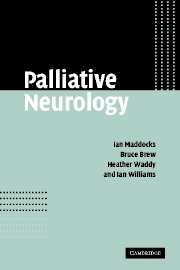Book contents
- Frontmatter
- Contents
- Foreword
- Note on drugs and abbreviations
- Section I Palliative Management
- Section II Major discomforts in advanced neurological illness
- 1 Fatigue
- 2 Problems with muscles and movement
- 3 Bulbar symptoms
- 4 Respiratory symptoms
- 5 Gastrointestinal symptoms
- 6 Urological symptoms
- 7 Pain
- 8 Cognitive, behavioural and psychological symptoms
- 9 Miscellaneous symptoms
- Section III Major neurological conditions requiring palliation
- Section IV Ethical issues
- Section V Appendices
- Index
5 - Gastrointestinal symptoms
from Section II - Major discomforts in advanced neurological illness
Published online by Cambridge University Press: 08 January 2010
- Frontmatter
- Contents
- Foreword
- Note on drugs and abbreviations
- Section I Palliative Management
- Section II Major discomforts in advanced neurological illness
- 1 Fatigue
- 2 Problems with muscles and movement
- 3 Bulbar symptoms
- 4 Respiratory symptoms
- 5 Gastrointestinal symptoms
- 6 Urological symptoms
- 7 Pain
- 8 Cognitive, behavioural and psychological symptoms
- 9 Miscellaneous symptoms
- Section III Major neurological conditions requiring palliation
- Section IV Ethical issues
- Section V Appendices
- Index
Summary
DRY MOUTH
A dry and painful mouth diminishes quality of life for patients with a terminal illness. Simple measures to relieve this discomfort can result in improved appetite, easier eating and enhance the sense of well-being.
Thirst is a complex symptom with many contributory causes. Adequate management of dry mouth and close attention to mouth care can significantly reduce the discomfort of thirst.
Dehydration is one factor in dry mouth and thirst; others include mouth breathing, increased respiratory effort, diminished saliva production and medications (tricyclic antidepressants, antihistamines and anticholinergics may all contribute).
Some patients with bulbar symptoms are still able to lift a cup to moisten the mouth. If not, spraying the mouth with plain water from a plastic bottle or atomizer gives good relief.
Careful and repeated mouth toilets assist comfort, and involve:
mouthwashes every few hours with sodium bicarbonate solution or plain water;
analgesic gels or liquids to counter-act pain from ulceration;
cleaning away of debris with moist swab-sticks;
gentle brushing of the teeth;
encouragement of saliva flow with fresh pineapple pieces, frozen lemon slices, frozen tonic water or chewing gum, plus frequent sips from a feeding cup, syringe or on a soaked swab.
Artificial saliva is not always valuable; mouth washes containing alcohol can increase the dryness. Lip dryness and cracking adds to the discomfort of dry mouth and is assisted by frequent, thin applications of petroleum jelly.
- Type
- Chapter
- Information
- Palliative Neurology , pp. 77 - 88Publisher: Cambridge University PressPrint publication year: 2005



